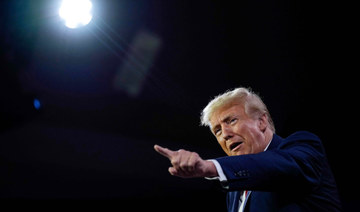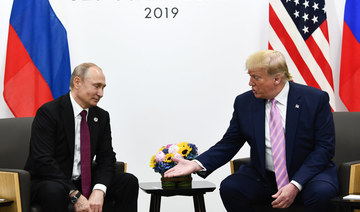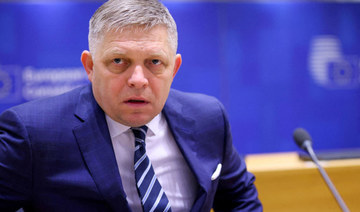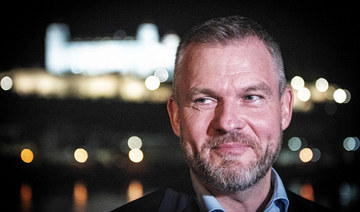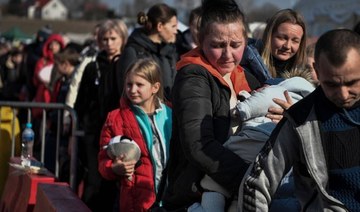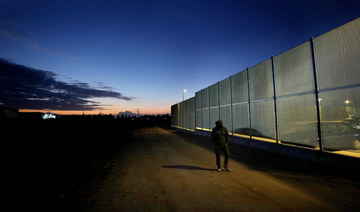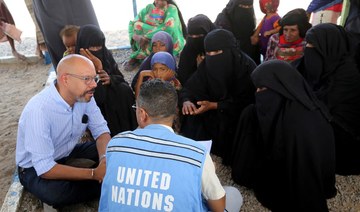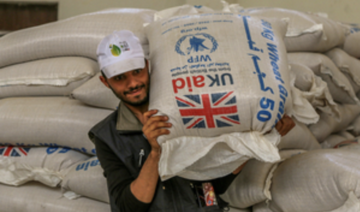WASHINGTON: Donald Trump wants to see President Joe Biden impeached, and the former president’s allies in Congress and his 2024 GOP presidential rivals are eager to join that fight as his own legal challenges mount.
Trump’s chief opponent, Florida Gov. Ron DeSantis, this week said the House Republicans “are absolutely within their rights” to consider an impeachment inquiry against Biden. Former UN ambassador Nikki Haley, also running for president, said Republicans would be “justified to do it.” And House GOP leaders aligned with Trump are foreshadowing what’s ahead.
“House Republicans will leave no stone unturned,” said Rep. Elize Stefanik of New York, the fourth-ranking House GOP leader and a top Trump ally, who is sometimes mentioned as a potential vice presidential pick.
This week, the prospect of impeaching Biden over the business dealings of his son, Hunter Biden, emerged from the far corners of the GOP’s right flank to the mainstream in the Republican Party.
Speaker Kevin McCarthy announced on Fox News that the House may open an impeachment inquiry into Biden, and expanded on his plans at a Tuesday press event at the Capitol.
Behind closed doors Wednesday, however, the Republican speaker told GOP colleagues it’s early in the impeachment process, and McCarthy acknowledged there’s still much that is unknown about Joe Biden and whether he had any awareness or involvement in his son’s business deals that would arise to an impeachable offense.
“The speaker went through what we know and what we don’t know,” said Rep. Tom Cole, R-Oklahoma, a seasoned lawmaker and committee chairman.
“There’s a lot we don’t know — we don’t know if any money went directly to President Biden or not,” Cole said, explaining the message to the House GOP. “That’s what they do the investigations about.”
Rep. Marjorie Taylor Greene, R-Ga., said McCarthy also told them if it comes to a Biden impeachment inquiry, he’s going to ask that “you be with me on this.”
Greene, a Trump ally backing impeachment, said no one rose during the private meeting to object.
By putting Biden on notice that the House is considering an inquiry, the Republicans are elevating a once rare congressional check on executive power — the formal impeachment charges over high crimes and misdemeanors — into yet another tool being wielded in party politics.
It’s a political escalation, urged on by Trump, after his own two impeachments. The prospect of a Biden impeachment inquiry also comes as Trump faces mounting legal cases, including a potential federal indictment in the investigation led by Special Counsel Jack Smith over his efforts to overturn the election in the run-up to the Jan. 6, 2021 attack on the Capitol.
Trump is the only president in US history that has been twice impeached — first in 2019 over his phone call urging Ukrainian President Volodymyr Zelensky to dig up dirt on the Bidens or risk losing US military aid, and again in 2021 in the aftermath of the Jan. 6, 2021 attack on the Capitol by Trump supporters trying to overturn Biden’s election.
Now, as the Republican party’s frontrunner for the nomination to take on Biden in 2024, Trump has long seethed over his impeachments at the hands of House Democrats. McCarthy has suggested the Trump impeachments could be expunged, as proposed by Stefanik and Greene. But Trump wants Biden to face similar impeachment charges.
“They impeach me over a ‘perfect’ phone call, and they don’t impeach Biden,” Trump posted online in capital letters this week, calling the current president “corrupt.”
Last week, at a Fox News town hall in Iowa, Trump expressed similar complaints asking: “Why aren’t they impeaching Biden? ... Why isn’t he under impeachment?”
House Republicans in various committees are probing the Bidens and suggesting the president may have been aware or involved in his son Hunter Biden’s work, particularly when the younger Biden served on the board of the Ukrainian energy firm Burisma.
The Republicans in Congress point to testimony from two IRS whistleblowers who testified last week the Justice Department slow-walked their investigation into Bidens, a claim the agency rejects. The Republicans also publicly released what the FBI says is unverified information from a confidential informant alleging Burisma payments to the Bidens as bribes, though other documents show a top company official disputing any payments were made.
Hunter Biden had agreed to plead guilty to misdemeanor charges of tax evasion stemming from a federal investigation, but the deal unraveled Wednesday when a judge raised questions about it.
“I’ve seen enough. We need a special counsel who has jurisdiction over any and all Biden family investigations,” Chris Christie, another Trump rival in the 2024 race, said on social media.
The White House has declined to engage in specific questions about any House GOP impeachment inquiry against Biden.
“They can do whatever it is that they wish to do, but we’re going to stay focused,” White House press secretary Karine Jean-Pierre said earlier this week, pointing to the “real priorities that the American families care about.”
Biden himself has repeatedly said that he does not talk with his son about his overseas business dealings.
As Hunter Biden appeared in court Wednesday, the press secretary issued a statement: “As we have said, the president, the first lady, they love their son, and they support him as he continues to rebuild his life.”
Not all Republicans are on board with the House’s plans to consider an impeachment inquiry, but those who object may face political retribution from Trump.
Senate Republican Leader Mitch McConnell said Wednesday he understands House Republicans may be incentivized to launch an impeachment inquiry after Trump was impeached twice when Democrats had control of the chamber.
But the Kentucky Republican warned fellow Republicans of continuing down this path.
“Impeachment ought to be rare rather than common,” said McConnell, who has long endured Trump’s ire and hasn’t spoken to him since the month before the Capitol attack. “I think this is not good for the country when we have repeated impeachment.”
Trump this week singled out other Republican senators, including John Cornyn of Texas and Mitt Romney of Utah, who had expressed their reluctance to launch impeachment proceedings.
House Democrats have declared the effort to impeach Biden political extremism and signaled they will oppose it.
“I’m very well aware of how important it is to follow the facts and the evidence before you reach any conclusions — and the Republicans are doing the reverse,” said Democratic Rep. Dan Goldman of New York, a chief prosecutor in the House’s first impeachment of Trump in 2019.
“What they are talking about now is pure political retribution that is not based on facts and evidence,” he said, adding that’s “abusing the impeachment power of the Congress.”
Trump wants to see Biden impeached, and other Republicans are quick to pile on
https://arab.news/muqxd
Trump wants to see Biden impeached, and other Republicans are quick to pile on
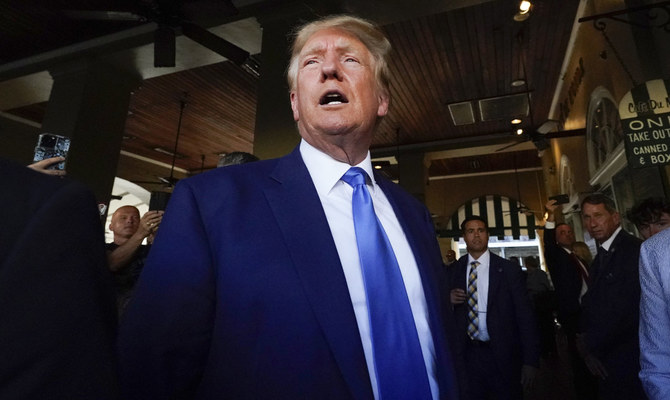
- Trump is the only president in US history that has been twice impeached — first in 2019 and again in 2021
India grants citizenship to first batch of immigrants from Pakistan, Afghanistan, Bangladesh

- Citizenship Amendment Act grants citizenship to Hindus, Parsis, Sikhs, Buddhists, Jains and Christians who fled to India
- Controversial citizenship law has been criticized by rights activists as being discriminatory toward country’s Muslims
NEW DELHI: India granted citizenship on Wednesday to a first batch of 14 people under a controversial law that has been criticized for discriminating against Muslims, midway through general elections in which religious divisions have taken center stage.
The Citizenship Amendment Act (CAA) grants citizenship to Hindus, Parsis, Sikhs, Buddhists, Jains, and Christians who fled to India from Muslim-majority Afghanistan, Bangladesh and Pakistan before Dec. 31, 2014 because of religious persecution.
Enacted in 2019, the law was not immediately implemented due to strong protests and sectarian violence in New Delhi and other places that resulted in the death of scores of people.
India implemented the act in March, weeks before the ongoing elections in which Prime Minister Narendra Modi and his Hindu nationalist Bharatiya Janata Party (BJP) are seeking a rare third consecutive term. Both deny CAA is anti-Muslim.
Four phases of the seven-phase election have concluded and votes will be counted on June 4.
On Wednesday, the recipients were administered the oath of allegiance and granted citizenship after their documents were verified, the home ministry said in a statement, without elaborating on their identities.
Hindu majority India has the world’s third-largest Muslim population with 200 million people. Rights and opposition groups have criticized Modi’s government and BJP saying they target the minority community and systematically discriminate against them to further the party’s core, Hindu revivalist ideology.
Modi and BJP deny the accusation and say they work for the welfare of all communities.
They have also said that the citizenship law only makes it easy for non-Muslim refugees to get a dignified life and is meant to grant citizenship, not take it away from anyone. Muslim refugees, they said, can apply under regular rules governing citizenship.
“This is like being reborn,” Harish Kumar, a Hindu refugee from Pakistan living in Delhi for over a decade, told news agency ANI after getting his citizenship on Wednesday. “If a person doesn’t have rights then what is the point, (now) we can go forward in education, jobs.”
India began voting on April 19 in the seven-phase election for which Modi launched his campaign by showcasing his economic record, governance and popularity. But he changed tack after the first phase to accuse the main opposition Congress party of being pro-Muslim and the issue has gained prominence since.
Analysts say this is likely aimed at firing up BJP’s Hindu nationalist base after a low turnout in the first phase sparked doubts that BJP and its allies could win the landslide that the party sought.
Slovakia PM Robert Fico wounded in shooting

- Robert Fico, 59, was hit in the stomach after four shots were fired outside the House of Culture in the town of Handlova
- European Commission President Ursula von der Leyen condemned what she described as a ‘vile attack’
BRATISLAVA, Slovakia: Slovakia’s populist Prime Minister Robert Fico was wounded in a shooting Wednesday afternoon and taken to hospital.
Reports on TA3, a Slovakian TV station, said that Fico, 59, was hit in the stomach after four shots were fired outside the House of Culture in the town of Handlova, some 150 kilometers northeast of the capital, where the leader was meeting with supporters. A suspect has been detained, it said.
Police sealed off the scene, and Fico was taken to a hospital in Banska Bystrica.
The shooting in Slovakia comes three weeks ahead of crucial European Union Parliament elections, in which populist and hard-right parties in the 27-nation bloc appear poised to make gains.
Deputy speaker of parliament Lubos Blaha confirmed the incident during a session of Parliament and adjourned it until further notice, the Slovak TASR news agency said.
Slovakia’s major opposition parties, Progressive Slovakia and Freedom and Solidarity, canceled a planned protest against a controversial government plan to overhaul public broadcasting that they say would give the government full control of public radio and television.
“We absolutely and strongly condemn violence and today’s shooting of Premier Robert Fico” said Progressive Slovakia leader Michal Simecka. “At the same time we call on all politicians to refrain from any expressions and steps which could contribute to further increasing the tension.”
President Zuzana Caputova condemned “a brutal and ruthless” attack on the premier.
“I’m shocked,” Caputova said. “I wish Robert Fico a lot of strength in this critical moment and a quick recovery from this attack.”
Fico, a third-time premier, and his leftist Smer, or Direction, party, won Slovakia’s Sept. 30 parliamentary elections, staging a political comeback after campaigning on a pro-Russian and anti-American message.
Critics worried Slovakia under Fico would abandon the country’s pro-Western course and follow the direction of Hungary under populist Prime Minister Viktor Orbán.
Thousands have repeatedly rallied in the capital and across Slovakia to protest Fico’s policies.
Condemnations of political violence came from leaders across Europe.
European Commission President Ursula von der Leyen condemned what she described as a “vile attack.”
“Such acts of violence have no place in our society and undermine democracy, our most precious common good,” von der Leyen said in a post on X.
Leaders in Latvia and Estonia also quickly condemned political violence.
Polish Prime Minister Donald Tusk wrote on the social media network X: “Shocking news from Slovakia. Robert, my thoughts are with you in this very difficult moment.”
EU agrees on a new migration pact, as mainstream parties hope it will deprive the far right of votes
EU agrees on a new migration pact, as mainstream parties hope it will deprive the far right of votes

- EU government ministers approved 10 legislative parts of The New Pact on Migration and Asylum
- Mainstream political parties believe the pact resolves the issues that have divided member nations since migrants swept into Europe in 2015, most fleeing war in Syria and Iraq
BRUSSELS: European Union nations endorsed sweeping reforms to the bloc’s failed asylum system on Tuesday as campaigning for Europe-wide elections next month gathers pace, with migration expected to be an important issue.
EU government ministers approved 10 legislative parts of The New Pact on Migration and Asylum. It lays out rules for the 27 member countries to handle people trying to enter without authorization, from how to screen them to establish whether they qualify for protection to deporting them if they’re not allowed to stay.
Hungary and Poland, which have long opposed any obligation for countries to host migrants or pay for their upkeep, voted against the package but were unable to block it.
Mainstream political parties believe the pact resolves the issues that have divided member nations since well over 1 million migrants swept into Europe in 2015, most fleeing war in Syria and Iraq. They hope the system will starve the far right of vote-winning oxygen in the June 6-9 elections.
However, the vast reform package will only enter force in 2026, bringing no immediate fix to an issue that has fueled one of the EU’s biggest political crises, dividing nations over who should take responsibility for migrants when they arrive and whether other countries should be obligated to help.
Critics say the pact will let nations detain migrants at borders and fingerprint children. They say it’s aimed at keeping people out and infringes on their right to claim asylum. Many fear it will result in more unscrupulous deals with poorer countries that people leave or cross to get to Europe.
WHY ARE THE NEW RULES NEEDED?
Europe’s asylum laws have not been updated for about two decades. The system frayed and then fell apart in 2015. It was based on the premise that migrants should be processed, given asylum or deported in the country they first enter. Greece, Italy and Malta were left to shoulder most of the financial burden and deal with public discontent. Since then, the ID-check-free zone known as the Schengen Area has expanded to 27 countries, 23 of them EU members. It means that more than 400 million Europeans and visitors, including refugees, are able to move without showing travel documents.
WHO DO THE RULES APPLY TO?
Some 3.5 million migrants arrived legally in Europe in 2023. Around 1 million others were on EU territory without permission. Of the latter, most were people who entered normally via airports and ports with visas but didn’t go home when they expired. The pact applies to the remaining minority, estimated at around 300,000 migrants last year. They are people caught crossing an external EU border without permission, such as those reaching the shores of Greece, Italy or Spain via the Mediterranean Sea or Atlantic Ocean on boats provided by smugglers.
HOW DOES THE SYSTEM WORK?
The country on whose territory people land will screen them at or near the border. This involves identity and other checks -– including on children as young as 6. The information will be stored on a massive new database, Eurodac. This screening should determine whether a person might pose a health or security risk and their chances of being permitted to stay. Generally, people fleeing conflict, persecution or violence qualify for asylum. Those looking for jobs are likely to be refused entry. Screening is mandatory and should take no longer than seven days. It should lead to one of two things: an application for international protection, like asylum, or deportation to their home country.
WHAT DOES THE ASYLUM PROCEDURE INVOLVE?
People seeking asylum must apply in the EU nation they first enter and stay until the authorities there work out what country should handle their application. It could be that they have family, cultural or other links somewhere else, making it more logical for them to be moved. The border procedure should be done in 12 weeks, including time for one legal appeal if their application is rejected. It could be extended by eight weeks in times of mass movements of people. Procedures could be faster for applicants from countries whose citizens are not often granted asylum. Critics say this undermines asylum law because applicants should be assessed individually, not based on nationality. People would stay in “reception centers” while it happens, with access to health care and education. Those rejected would receive a deportation order.
WHAT DOES DEPORTATION INVOLVE?
To speed things up, a deportation order is supposed to be issued automatically when an asylum request is refused. A new 12-week period is foreseen to complete this process. The authorities may detain people throughout. The EU’s border and coast guard agency would help organize joint deportation flights. Currently, less than one in three people issued with an order to leave are deported. This is often due to a lack of cooperation from the countries these people come from.
HOW HAS THE ISSUE OF RESPONSIBILITIES VS OBLIGATIONS BEEN RESOLVED?
The new rules oblige countries to help an EU partner under migratory pressure. Support is mandatory, but flexible. Nations can relocate asylum applicants to their territory or choose some other form of assistance. This could be financial -– a relocation is evaluated at 20,000 euros ($21,462) per person -– technical or logistical. Members can also assume responsibility for deporting people from the partner country in trouble.
WHAT CHALLENGES LIE AHEAD?
Two issues stand out: Will member countries ever fully enact the plan, and will the EU’s executive branch, the European Commission, enforce the new rules when it has chosen not to apply the ones already in place? The commission is due to present a Common Implementation Plan by June. It charts a path and timeline to get the pact working over the next two years, with targets that the EU and member countries should reach. Things could get off to a rocky start. Hungary, which has vehemently opposed the reforms, takes over the EU’s agenda-setting presidency for six months on July 1.
Calls mount on Polish government to expel Israeli envoy

- Israel dismissed calls for accountability after killing Polish aid worker in Gaza
- Ambassador compares peaceful protests in Poland to Nazi rallies
WARSAW: Polish activists on Wednesday submitted a nationwide petition for the government to immediately expel the Israeli ambassador over war crimes in Gaza.
Protests against Israel’s bombardment of the Palestinian enclave have been a regular occurrence in Poland since the beginning of the onslaught in October.
One of the main groups organizing the rallies and meetings to extend political pressure, and bring Poles closer to Palestinian history and culture, is the initiative Wschod — a movement of young activists dedicated to social justice.
Wschod’s petition to expel the Israeli envoy, Yacov Livne, from Poland, was signed by 7,931 people as of Wednesday.
“I believe that the petition is an important signal to the Polish government from the Polish people,” Zofia Hecht, a member of Wschod, told Arab News as the activists submitted the petition to the Ministry of Foreign Affairs in Warsaw.
“There is a large group of people who really do not agree with what Israel is doing to Palestinians, and that we do not agree to normalize relations with such a terrorist entity that is Israel.”
Poland recognizes Palestinian statehood and has voted in favor of the UN’s recent resolutions to demand an immediate ceasefire in Gaza, and to recognize backing Palestine’s bid for permanent membership status.
A close ally of the US, the Polish government has avoided vocal criticism of Tel Aviv and its war on Gaza, where Israeli forces have over the past seven months killed at least 35,000 people — a large majority women and children — and injured 80,000 more.
UN agencies and experts have repeatedly accused Israel of committing war crimes and crimes against humanity in Gaza. The International Court of Justice in January also found it plausible that Tel Aviv’s actions in the enclave could amount to genocide.
“We think that the previous actions taken by the Polish government to prevent the Israeli genocide in Gaza were not sufficient,” said Emil Al-Khawaldeh, Wschod’s Palestine campaign coordinator.
“We expect the Polish government to at least respond to our petition signed by almost 8,000 people, and to meet our demands to expel the Israeli ambassador.”
The petition was created when Poles began to pay more attention to Gaza after the killing of a Polish national, Damian Sobol, who was one of the seven World Central Kitchen aid workers targeted and killed by Israeli troops in early April.
“In April, when Israel killed a Polish citizen, the Israeli ambassador took to Twitter to publish accusations of antisemitism,” Al-Khawaldeh said, citing Livne’s posts, which included labeling a Polish parliament deputy speaker as an “antisemite” for publicly charging Israel with war crimes.
“Until now, the Israeli ambassador has neither apologized for his own words nor, on behalf of the state of Israel, for murdering a Polish citizen,” he added.
Wschod’s petition to the government says that “there is no place” in Poland for an ambassador of a “state committing genocide” and demands that he be “immediately” expelled.
“It is absurd that in a country historically affected by genocide, hatred and hostility, we allow the holding of office by a person who represents the government of a country committing war crimes against innocent Palestinian civilians,” it reads.
About 6 million Polish citizens, including 3 million Polish Jews, were killed by German forces during the invasion and occupation of Poland in the Second World War. The occupation policies have been recognized in Europe as a genocide.
Eight decades later, as Poles unite and take to the streets to prevent a genocide of another people, Al-Khawaldeh, who is Polish Palestinian, and Hecht, who is Jewish, said that they have faced accusations of antisemitism.
The accusations regularly come from the Israeli ambassador, who, in a radio interview in November, went as far as to compare the Polish peace activists to Nazis.
“We’ve been holding peaceful marches in Warsaw and there’s been no single security incident. But in November, the Israeli ambassador compared the marches to Nazi rallies ... he compared us with the Nazi Germany of the 1930s,” Al-Khawaldeh said.
“Polish Jews are also protesting with us. They are organizing protests in Poland, peaceful protests, they are also having wonderful speeches against Israeli war crimes, against Israeli genocide in Gaza. This accusation is absurd.”
UK announces $175 million humanitarian aid boost for Yemen

- Nearly 200 aid groups called for more humanitarian aid this month to bridge a $2.3-billion shortfall in funds for Yemen
LONDON: The UK will significantly increase aid funding to Yemen aiming to feed more than 850,000 people in the war-torn country, Foreign Secretary David Cameron said on Wednesday.
New aid worth £139 million (around $175 million) to help alleviate the humanitarian crisis in Yemen was announced in a meeting between Cameron and Yemeni Prime Minister Ahmed Awad bin Mubarak in London.
The aid will be delivered through partners such as the World Food Programme and Unicef, a statement read, and hopes to treat 700,000 severely malnourished children.
The move comes a week after the EU announced $125 million for NGOs and UN agencies working in Yemen, where more than half the 34 million population needs aid after nine years of war.
Nearly 200 aid groups called for more humanitarian aid this month to bridge a $2.3-billion shortfall in funds for Yemen.
Houthi rebel attacks on international shipping are also on the agenda in Cameron’s meeting with Bin Mubarak, who is Yemen’s former ambassador to the United States.
Cameron blamed the attacks on Red Sea shipping for aggravating the humanitarian crisis “through blocking aid from reaching those who need it in northern Yemen.”
British and US forces have been carrying out joint strikes since January aimed at curbing the raids.
The attacks, which began in November, were found to affect more than half of British exporters in a British Chambers of Commerce report from February.
Yemen has been gripped by conflict following a 2014 coup by the Iran-backed Houthi rebels, which triggered a Saudi-led military intervention in support of the government the following year.
Hundreds of thousands have died from fighting and other indirect causes such as the lack of food, according to the UN.
While hostilities have remained at a low level since a six-month UN-brokered ceasefire came into force in 2022, threats including food insecurity and cholera remain rampant.



